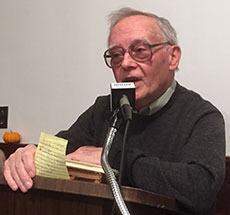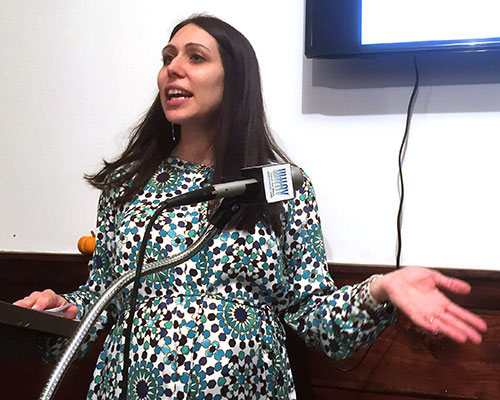Mandy Whittier Breton, a descendant of Thomas Whittier, tells the little known story of one of Haverhill’s pioneers. (WHAV News photograph.)

Whittier Birthplace Curator Augustine “Gus” Reusch reads a Whittier poem during the 132nd Annual Meeting of the Haverhill Whittier Club. (WHAV News photograph.)
John Greenleaf Whittier’s great great grandfather played critical roles in the early history of Haverhill, members of the Haverhill Whittier Club learned Sunday.
While it had been established that Thomas Whittier built the homestead in 1688 where the famous poet was born more than a century later, little was known about the patriarch’s role in community affairs. Gathering for the 132nd annual meeting of the Haverhill Whittier Club, members heard from Mandy Whittier Breton, a descendant of Thomas Whittier.
“There has been a descendant of Thomas Whittier living in Haverhill since the city was formed. They moved to Haverhill about 10 years after the city was formed and, since then, continuously,” she said.
Breton, a fifth-grade teacher at Bradford Elementary School who continues to live in Haverhill, revealed interesting facts. Thomas Whittier was 68 years old when he built his homestead near today’s Merrimac line. He chose the location near Fernside Brook for its access to fresh water and power for his grist mill, Breton said. More interestingly, however, he was long involved in the town’s governance.
The elder Whittier arrived in Haverhill in 1638. He served multiple terms as a selectman between 1656 and 1687 and moderator for several terms. He declined to serve as constable in 1669, but agreed to help find someone to take the job. Knowing of John Greenleaf Whittier’s commitment to equality, Breton said she was pleased to find the trait ran in the family. In 1681, she explained, Thomas Whittier was selected to serve on a committee to repair the meeting house and make room for women.
“Which I find to be kind of appropriate for a Whittier to be repairing and restoring a meeting house to allow women and equality, to be able to come along.” She said further evidence of Whittier’s welcoming reputation came during a Native American raid on Haverhill during the late 1690s. Whittier’s family was allowed to stay safe in their home even as other Haverhillites were forced into garrison houses for protection.
While conducting research at England’s National Archives, Breton also found the elusive answer to a question about Thomas Whittier. There has always been a question about whether Thomas Whittier was born Salisbury, Mass., or Salisbury, England. Breton found he was born in Salisbury, England, in 1620.
97.9 WHAV will broadcast Breton’s complete Whittier Club address Wednesday night, Nov. 2, at 7 p.m.

